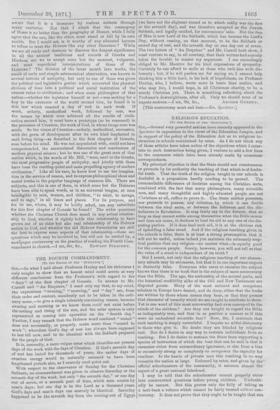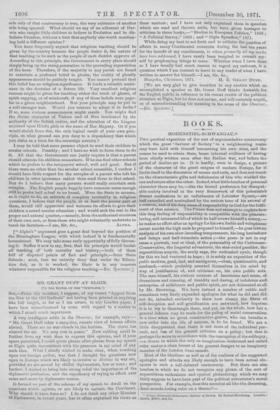RELIGIOUS EDUCATION.
rra 'THE EDITOR OF THR uSPRCTILTOR:1 Sin,—Several very powerful articles have recently appeared in the Spectator in opposition to the views of the Education League, and in support of the policy of the Education Act as to religious in- struction in schools maintained by rates. As I do not think any of these articles have taken notice of the objections which I enter- tain to such instruction being given, I venture to add a few lines to the comments which have been already made by numerous correspondents.
My principal objection is that the State should not countenance or promote by its authority the teaching of that which is of doubt- fel truth. That the truth of the religion taught in our schools is doubtful is a proposition hardly needing to be proved. The irreconcilable differences of doctrine among the Christian sects, combined with the fact that many philosophers, many scientific men, and many thoughtful and highly educated people are not Christians at all, suffice to prove it. The State neither possesses, nor pretends to possess, any criterion by which it can decide between the rival sects, or between the believers and the dis- believers in Revelation. It may fairly say to the former, that so long as they eaunot settle among themselves what the Bible means and does not mean, it declines to lend its aid to any one of the dis- puting parties. If it does lend such aid, it is at the obvious risk of upholding a false creed. And if the religious teaching given in the schools is false, there is at least a strong presumption that it will not be useful, unless indeed you maintain the extremely scep- tical position that any religion—no matter what—is equally good for the common people. Surely, however, you will not tell us that the value of a creed is independent of its truth ?
But I meat, not only that the religious teaching of our elemen- tary schools may be erroneous, but that it in one important respect is distinctly false. Everyone who cares to examine the subject knows that there is no book that is the subject of more controversy than the Bible. The age, the authorship of the several parts, and the historical credibility alike of the Old and New Testament arc disputed points. Many of the most eminent and competent scholars in Europe have denied, and do deny, either that the books are written by those whose names they bear, or that they possess that character of veracity which we are taught to attribute to them. Yet is one word of this most noteworthy fact ever conveyed to the minds of the children? Are they not taught to regard the Bible as indisputably true, and that in as positive a manner as if this were an undoubted scientific fact ? Now, Sir, I maintain that such teaching is simply untruthful. I impute no wilful dishonesty to those who give it. No doubt they are blinded by religious zeal. Nor do I desire in any way to restrain individuals from so teaching. But I do desire to restrain the State from supporting a species of instruction of which the best that can be said is that it emanates either from extraordinary ignorance, or else from a bias so excessively strong as completely to overpower the capacity for candour. In the hands of private men this teaching in no way commits the nation at large. Enforced by rates, and given by the ` official schoolmasters of the community, it assumes almost the aspect of a great national falsehood.
I may be told that the schoolmaster cannot properly enter
into controverted questions before young children. Undoubt- edly be cannot. But this proves only the folly of taking as a text-book a volume which cannot be fairly treated without con- troversy. It does not prove that they ought to be taught that one
side only of that controversy is true, the very existence of another side being ignored. What should we say of an adherent of Dar- win who taught little children to believe in Evolution and to dis- believe Creation, without a hint that anybody elee worth mention- ing held a different opinion ?
You have frequently argued that religious teaching should be given by the country because the people desire it, the nature of that teaching to be such as the people Of each district approve of. According to this principle, the Government in every place should simply bring up the rising generation in the prevailing superstition of the hour. Therefore, if the majority in any parish are found to entertain a profound belief in ghosts, the reality of ghostly appearances should be publicly taught. You cannot pretend that this belief has no religious significance. It lends a valuable assist- ance to the doctrine of a future life. Very excellent religious reasons might be given for teaching either the truth of ghosts, of spirit-rapping, or of witchcraft, if any of these beliefs were popu- lar in a given neighbourhood. But your principle may be put to a still stronger test. Would you venture to adopt it in India ? If so, some curious consequences might result. You might find the divine character of Vishnu and of Siva inculcated by the authority of the British nation, and the adoration of the Lingam enjoined upon Hindu girls in the name of Her Majesty. Or if you would shrink from this, the only logical result of your own prin- ciple, on what ground can you deny to a dependency that which you claim as a boon for the sovereign country ?
I may be told that some persons object to send their children to secular schools. Possibly ; and I have no wish to force them to do it, All that the Government can justly require is that a parent should educate his children somewhere. If he can find other schools which he prefers to the ratepayers' school, well and good. But if there were no other than the secular school accessible, 1 confess I should have little respect for the scruples of a parent who left his children in utter ignorance rather than send them to that school. Nor do I believe that many parents would really entertain such scruples. The English people happily have common-sense enough still to prefer half-a-loaf to no bread- Were the State to assume, as it ought to do, an attitude of complete neutrality in religious questions, I believe that the people, or at least the poorer part of them, would still appreciate and welcome its efforts to give their children a sound secular education ; and would seek the rest in the proper and natural quarter, —namely, from the authorized ministers of their own sect, or from those who might voluntarily undertake to
teach its doctrines.—I am, Sir, Sze., ALPHA.
[" Alpha's" argument goes a great deal beyond the position of the Birmingham League, with which indeed it is fundamentally inconsistent. We may take some early opportunity of fully discuss- ing it. Suffice it now to say, first, that his principle would banish all teaching of both morality and history,—both of them full of disputed points of fact and principle,—from State Schools ; next, that we entirely deny that under the Educa- tion Ad, as it is worked, the State is in any measure whatever responsible for the religious teaching.—ED. Spectator.]



































 Previous page
Previous page